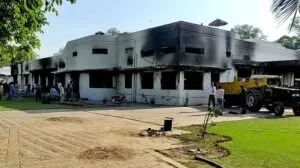Justice delayed is justice denied – William E. Gladstone
In 2022, a tragic incident highlighted the extent of corruption and misuse of power within Pakistan’s judicial system. The daughter of a Lahore High Court judge, who was intoxicated, ran over two young men with an official Prado car. The young men died instantly, and she fled the scene, abandoning the vehicle. Despite clear CCTV evidence against her, the subsequent events revealed a deeply ingrained corruption within the system.
The reckless driving by the judge’s daughter resulted in the deaths of two innocent youths. Instead of facing the consequences, she chose to escape, leaving the victims behind. The CCTV footage captured the entire incident, providing undeniable evidence of her guilt. However, rather than letting the law take its course, a series of manipulative actions ensued, exposing the extent of judicial corruption.
The judge, who later became the Chief Justice and is now a Supreme Court judge, used his influential position to obstruct justice. He pressured the police to close the case against his daughter. His son also played a role, visiting the victims’ families with several goons to intimidate them into withdrawing their complaint. They falsely claimed that another woman was driving the car, absolving the judge’s daughter of any responsibility.
Using his judicial connections, the judge ensured that the car involved in the incident vanished from the police station, replaced by another vehicle. All evidence was meticulously erased to protect his daughter. He further blocked the investigation. When the investigating officer tried to pursue the case, the Lahore High Court Registrar told him it was impossible to reach the judge. The officer’s case file was seized, and he was illegally detained in the court’s basement for several days. This blatant abuse of power showcased how far the so-called custodians of justice would go to protect their own, revealing a deeply flawed and corrupt system.
The families of the deceased were left in despair. Despite overwhelming evidence and clear culpability, justice seemed unattainable. The father of one victim held a press conference, pleading for justice, but his cries fell on deaf ears. The media, fearing repercussions from the judiciary, chose not to cover the matter adequately. The fear of contempt charges stifled attempts to bring the truth to light. This dire situation led the bereaved father to contemplate extreme measures, including self-immolation, as a form of protest against the crippled criminal justice system. The thought that a man might set himself on fire due to the systemic failure to deliver justice is a damning indictment of the judiciary in Pakistan.
The media’s reluctance to cover this issue highlights a broader issue: the judiciary’s unchecked power and the fear it instills. When institutions meant to uphold justice become sources of intimidation, the media’s role as a watchdog is compromised. This incident raises critical questions about press independence and its ability to hold powerful figures accountable. The case of this judge and his daughter is not just an isolated incident; it reflects a systemic problem. When those tasked with upholding the law break it with impunity, it erodes public trust in the judiciary. The victims’ families deserve justice, and the public deserves a judicial system that is transparent, accountable, and impartial.
For true justice to prevail, there must be a thorough investigation into the actions of this judge and those who aided him in obstructing justice. The judiciary must be held to the same standards as ordinary citizens, if not higher, given their societal role. This incident should serve as a wake-up call for comprehensive judicial reforms to prevent the abuse of power and ensure the rule of law is upheld.
The is a stark reminder of the urgent need for accountability within Pakistan’s judicial system. It highlights how misuse of power can devastate lives and undermine public trust in institutions meant to protect and serve justice. The victims’ families continue to seek justice, and their plight should not be ignored. It is imperative that the judiciary be reformed to prevent such abuses of power in the future, ensuring that justice is truly blind and serves all members of society equally.
Sehr Rushmeen, an Islamabad based freelance researcher, did her MPhil from National Defence University (NDU) in Strategic Studies, and her BSc from University of London (UOL) in International Relations. Her area of research interest is Strategic Nuclear Studies, Artificial Intelligence in Warfare, South China Sea and South Asian Politics. She tweets as @rushmeentweets and can be reached on sehrrushmeenwrites@gmail.com.



